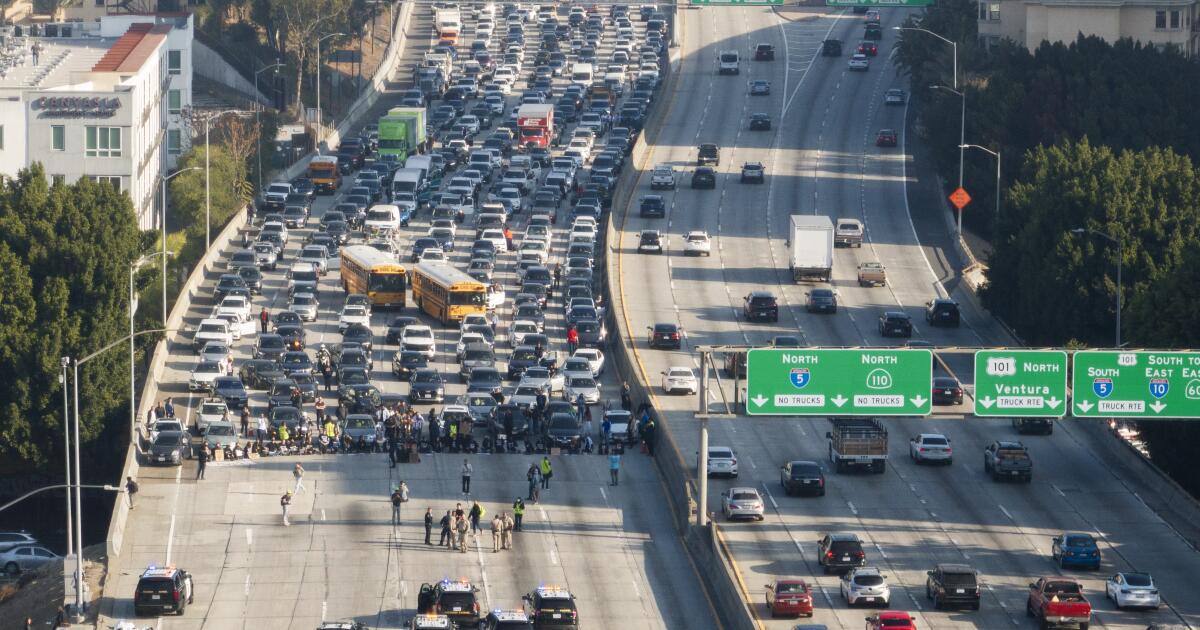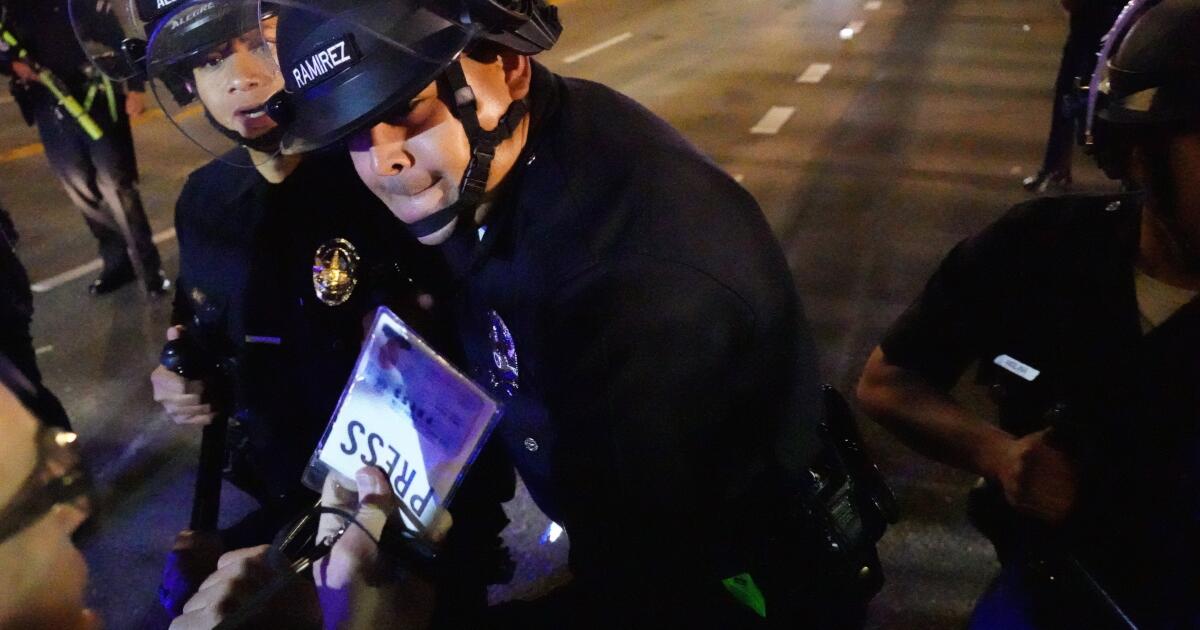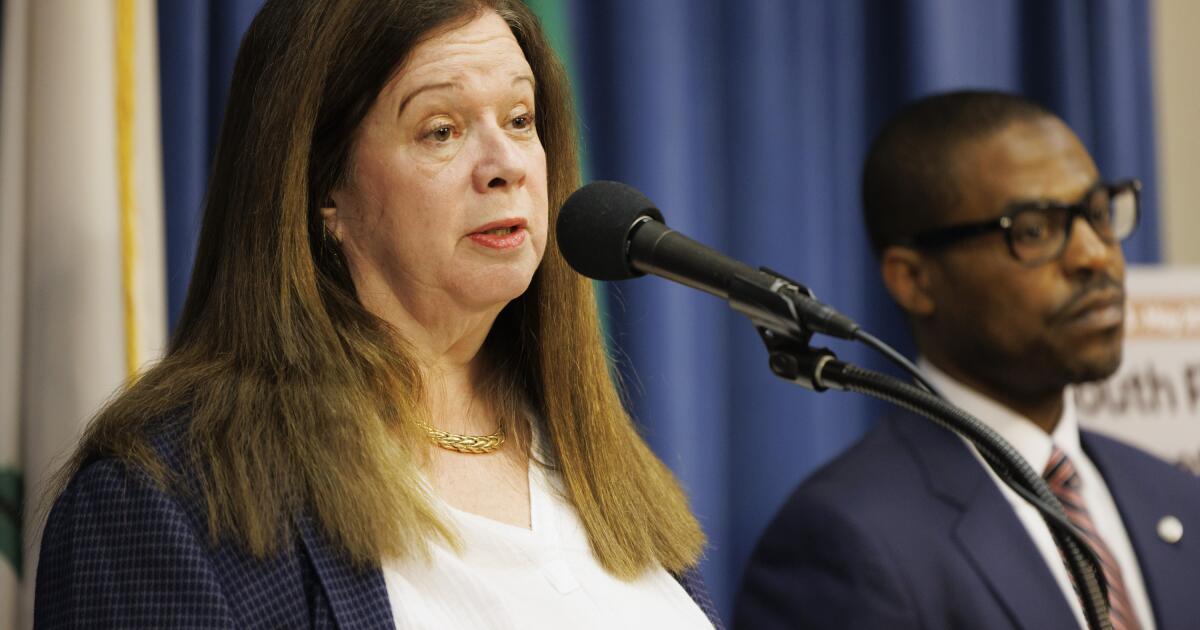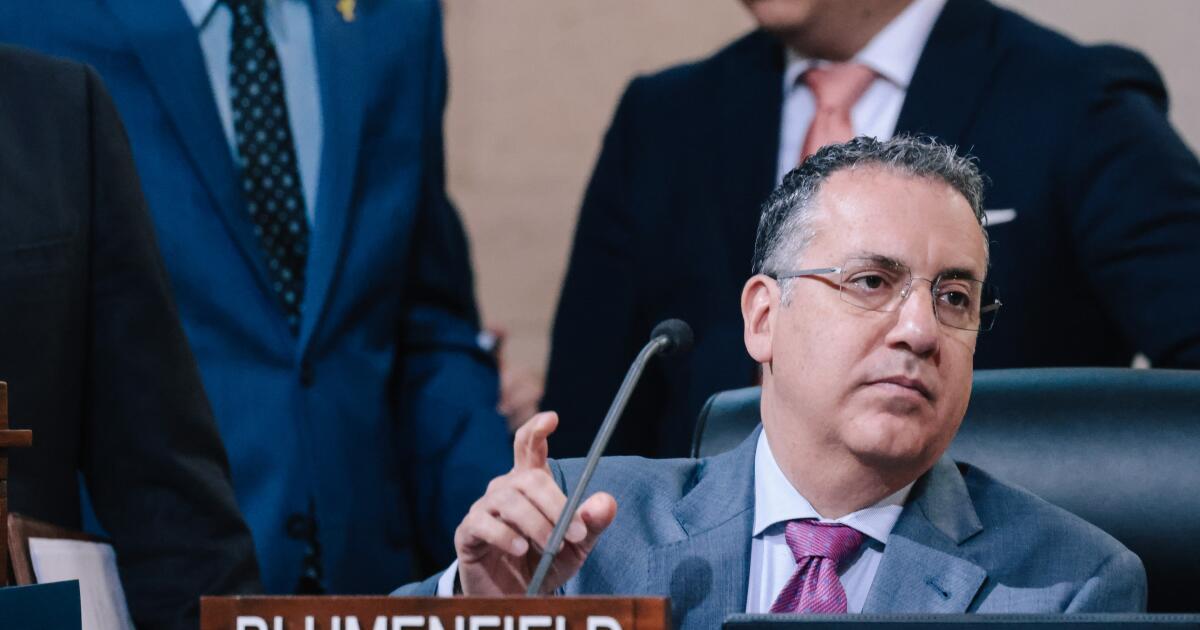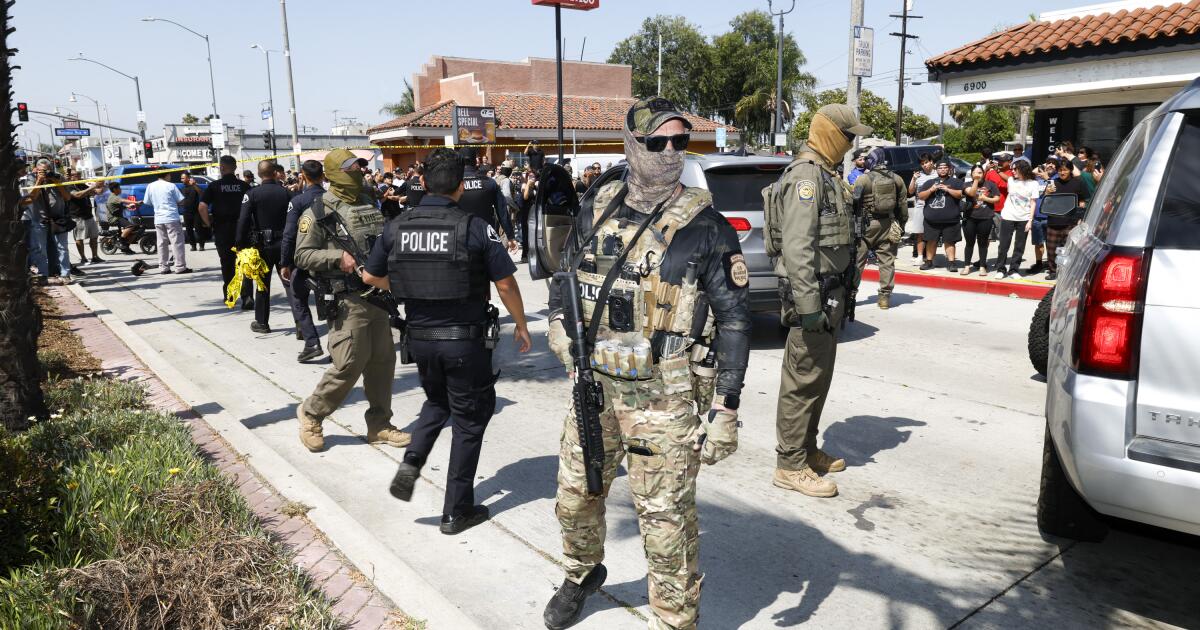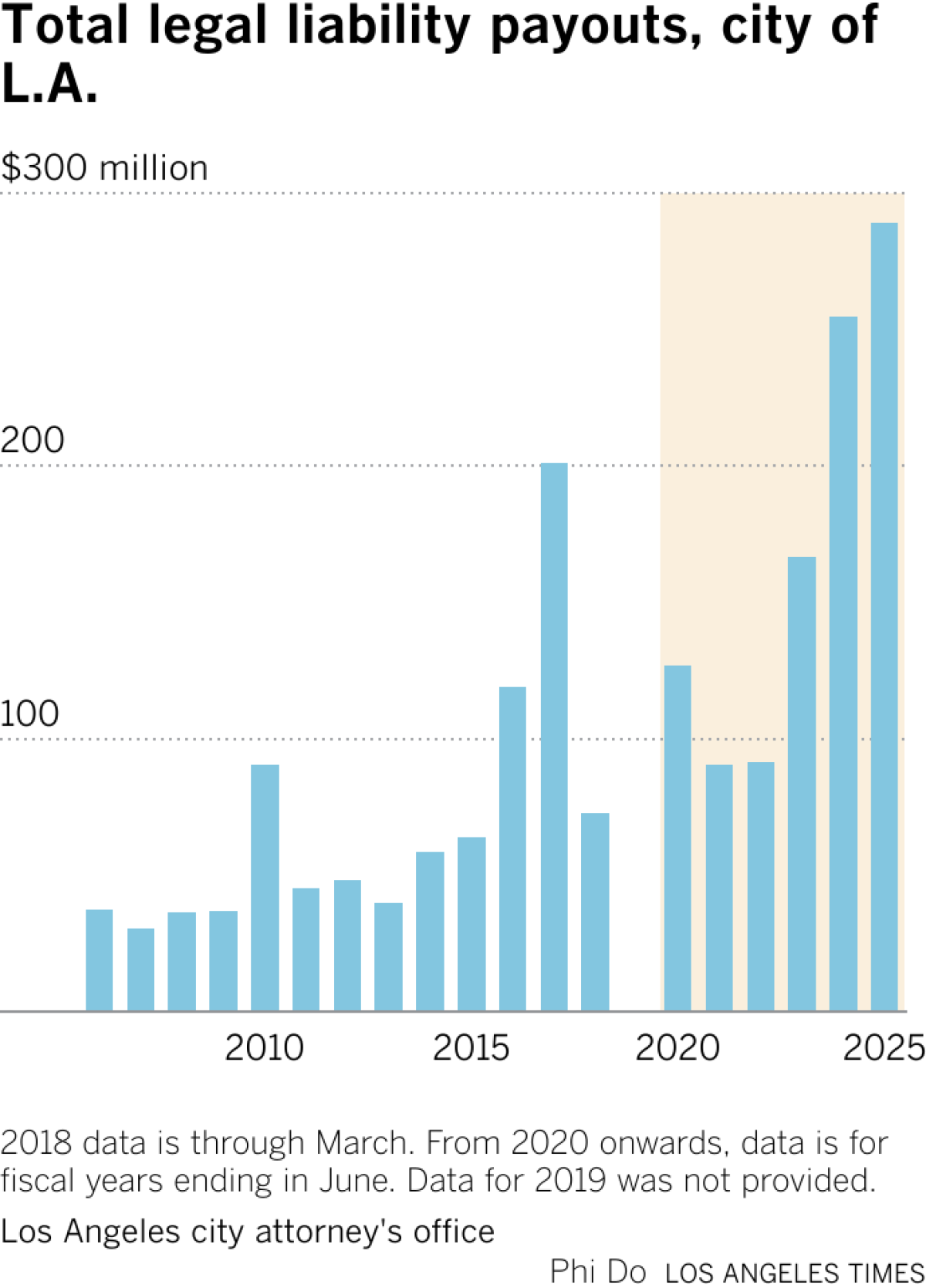The amount of money that the city of Los Angeles pays annually for police misconduct, trip and falls, and other lawsuits has ballooned, rising from $64 million a decade ago to $254 million last year and $289 million this fiscal year.
The reasons are complicated, ranging from aging sidewalks to juries’ tendency to award larger judgments to possible shifts in legal strategy at the city attorney’s office to an increase in the sheer number of lawsuits against the city.
The biggest chunk of payouts over the past five years were for “dangerous conditions” — lawsuits singling out faulty city infrastructure, such as broken elevators — at 32%, followed by civil rights violations and unlawful uses of force at 18%, and traffic collisions involving city vehicles also at 18%.
City officials have cited the legal payouts as a significant factor in a nearly $1-billion budget shortfall for fiscal year 2025-26 that was closed with layoffs and other spending cuts.
City Atty. Hydee Feldstein Soto, who took office in December 2022, heads the office that defends the city against lawsuits.
In an interview with The Times and public appearances throughout the city, Feldstein Soto cited a backlog of cases from the COVID-19 pandemic, when courts were barely moving, that were settled or went to trial in recent years.
“Structured settlements” negotiated by her predecessor, Mike Feuer, which are paid out annually rather than in one lump sum, have also contributed to the tab, she said.
Feldstein Soto also said she believes juries are increasingly antagonistic to city governments, resulting in larger verdicts.
Feuer said in an interview that the city was entering into structured settlements before he took office, and he does not believe he increased their use.
To explain the rise in legal liability payouts during his tenure — from about $40 million in 2013 to about $91 million in 2022 — Feuer cited a lack of investment in city infrastructure like streets and sidewalks during the 2008 financial crisis.
In public appearances, Feldstein Soto has sometimes blamed plaintiffs for trying to get financial compensation for what she characterized as risky behavior or interpersonal disputes.
Speaking to the Sherman Oaks Homeowners Association earlier this year, she said that two types of lawsuits — “dangerous conditions” lawsuits and those brought by city employees over working conditions — are ripe for abuse. Some employees who sue the city simply don’t like their bosses, Feldstein Soto said, citing a lawsuit by an LAPD captain, Stacey Vince, who alleged that higher-ups retaliated against her after she complained about her boss. Vince was awarded $10.1 million by a jury, and the city subsequently settled the case for just under $6 million.
Feldstein Soto also described one man who sued the city as an “idiot.” The man was riding his electric scooter without a helmet, Feldstein Soto said, when he crashed on an uneven sidewalk and into a nearby tree, suffering a traumatic brain injury.
According to Feldstein Soto, taxpayers ultimately pay the price for these lawsuits.
“Please understand that every dollar you award is your money,” she said.
The number of lawsuits filed against the city has risen each year since the pandemic, from 1,131 in 2021 to 1,560 in 2024.
At the same time, the average amount the city pays per case has increased dramatically, from under $50,000 in 2022 to $132,180 in 2024. A contributing factor is the increase in payouts of least $1 million, with 17 such cases in 2022 and 39 in 2024. (The city counts settlements or jury verdicts in the fiscal year they are paid out, not when the dollar amount is decided.)
From July 2024 to March 2025, the city paid $1 million or more in 51 lawsuits.
Feldstein Soto said these “nuclear verdicts” cut deep into the city budget and could raise payouts for similar cases in the future.
Total annual payouts in police misconduct cases jumped from $15 million in 2020 to $50 million in 2024. Dangerous conditions cases rose from around $41 million in 2020 to about $84 million in 2024.
Earlier this year, the city paid $21 million to plaintiffs in a series of lawsuits related to a botched LAPD bomb squad fireworks detonation that injured more than 20 people and displaced many residents.
Also this year, the city paid out a $17.7-million verdict to the family of a man with mental health issues killed by an off-duty LAPD officer.
This coming fiscal year, the city increased its allocation for liability payouts from about $87 million to $187 million — far less than what it has been paying in recent years — out of a $14-billion budget.
City Councilmember Eunisses Hernandez, who chairs the council’s public works committee, said the rising payouts stem in part from the city’s long-term lack of investment in infrastructure. The city spent about 10% of its overall budget on streets and other public works last year — substantially less than it spent on police, said Hernandez, who favors a smaller LAPD.
“As a city, we don’t invest in the maintenance of our city,” she said. “I have felt like I’ve been screaming into the void about some of these things.”
In one lawsuit paid out this year, the city agreed to give $3 million to a man who tripped over a slightly uneven sidewalk and suffered a traumatic brain injury.
Last April, the city reached a $21-million settlement with a man whose skull was broken by a street lamp part that fell on him. The city had gone to trial, with a jury awarding the man $22 million, but the parties eventually settled for the slightly lower amount.
“I believe the driving force is the delays and lack of maintenance of the city that has caused an increase in such incidents,” said Arash Zabetian, a lawyer for the man hit by the streetlight.
Some plaintiffs’ attorneys say that Feldstein Soto’s legal strategies are contributing to the rising liability costs. They assert that she is taking more cases to trial, resulting in larger verdicts than if she had settled.
Matthew McNicholas, an attorney who often sues the city on behalf of police officers, said he recently went to trial in five cases and won all of them, for a total payout of more than $40 million.
He would have been happy to settle all five cases for a total of less than $10 million, he said.
One of the lawsuits, which ended with a $13-million verdict, was filed by two male officers accused of drawing a penis on a suspect’s abdomen. The officers alleged that higher-ups did not cast the same suspicion on their female colleagues.
In another of the lawsuits, a whistleblower alleged that he was punished for highlighting problems in the LAPD Bomb Detection K-9 Section. A jury also awarded him $13 million.
“It’s not a tactic to say we’re going to play hardball. It’s just stupid,” McNicholas said. “I am frustrated because she goes and blames my clients and runaway juries for her problems.”
Greg Smith, another plaintiffs’ attorney, said he has also noticed a tendency at Feldstein Soto’s office to push cases to trial.
“Everything is a fight,” Smith said. “I have been suing the city for 30 years, and this has been the worst administration with respect to trying to settle cases.”
Feldstein Soto said her office settles “every case we can.”
“It’s in nobody’s interest to go to trial. It’s a waste of resources,” she said. “But we will not settle cases where we don’t think we’re liable or where the demand is unreasonable.”
To stem the flood of large payouts, Feldstein Soto is looking to Sacramento for help, proposing a bill that would cap lawsuits against California cities at $1 million or three times the economic losses caused by an incident, whichever is greater. Caps on damages exist already in 38 states, according to Feldstein Soto’s office.
She has yet to find a state legislator to sponsor the bill.
